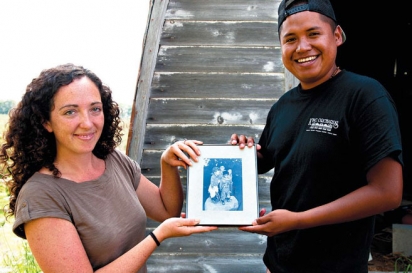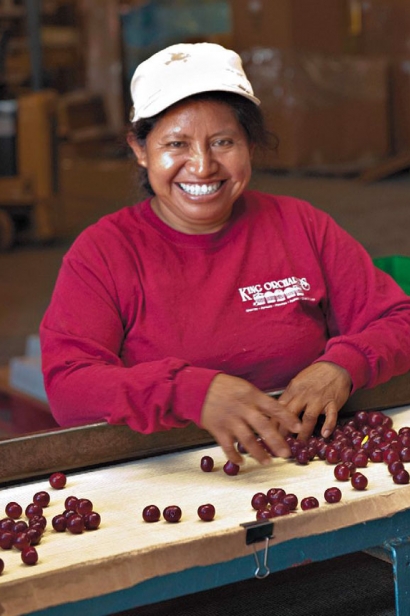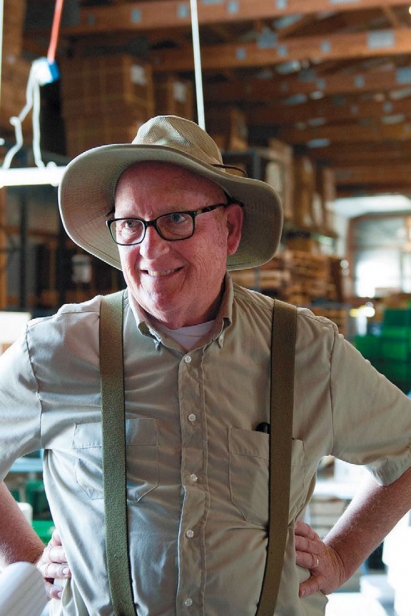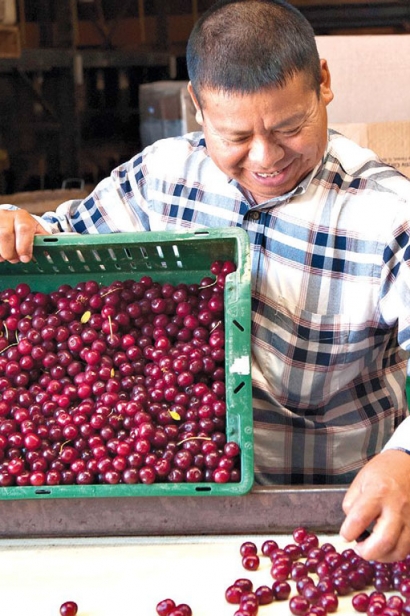King Orchards: When North Meets South
If you don’t think food can change the world, consider this story: Four couples, originally living 3,000 miles apart in climates and cultures as different as night and day: steamy hot months for two of them, and bitter cold months for the other two; prosperity in property in Michigan, probable poverty in Central America. If you don’t think food can change the world, consider this story.
As food so often does, it brought these families together. The farmers’ vision and a working family’s fortitude—what followed was never imagined, never planned, but perfectly ordered for both families and their futures.
John King purchased his first cherry orchard 36 years ago with a farmer’s home loan from the U.S. government. It didn’t take long to turn into a family business when his new wife, Betsy, and brother, Jim, joined him in 1981 and 1983, respectively. In 1993, Jim’s wife, Rose, would also join the business.
Today the Kings farm 400 acres of sweet and tart cherries, intermixed with apple trees, nectarines, plums, corn, berries and more fruits and vegetables than they anticipated growing.
Betsy King says in earnest that she doesn’t know how other farm families manage laborers or deal with immigration. She only knows what they have done: create a family. In their third summer of farming, two young Guatemalan couples came to King Orchards looking for work. They returned the next summer, and the next. As they started families of their own, brothers Jesus and Pedro Francisco and their wives, Maria and Juana, wanted to stay with the Kings through the winter if they had work—rather than travel to Florida or Texas for the next growing season.
“We knew they had choices and were highly valued. So we added housing, and eventually winterized it to keep them here and comfortable,” Betsy says.
The housing helped and these Guatemalan couples decided to tough it out in Northern Michigan together.
Since then, John and Jim started growing sweet corn, then cucumbers, strawberries and raspberries, then squash and apples for picking and cider. As the farming and harvest season grew, so did the hand labor crew. More of the Franciscos’ family and friends came from Guatemala, living and working on King Orchards’ farms.
“I remember when we purchased a house for Jesus and Maria as the labor housing camp was expanding, and they were delighted. But it was down the road from the farm and Maria missed being right next to the other families, the social aspect,” Betsy recounts. Today, Maria and other elders watch grandbabies, tend chickens and make the family tortillas every morning a few miles from the farm.
Several of the adult children are now integral parts of King Orchards’ operations.
Jesus, son of Pedro and Juana, manages the market on US-31 while also pursuing his business degree from Northern Michigan College. His cousin, also named Jesus, is the shipping manager for the farm and seems certain about his career location. After going to college, visiting Florida and Guatemala, he returned to the farm. An avid snowboarder, he says he missed winter. “This is home to me. It always will be,” he says with determination.
This is the type of closeness this family craves—all of them. They work side by side, from the farm market to the orchards to the packing belt. Their hands literally touch every sweet cherry that the Kings sell and every tree that is planted. Hand labor is a precision job and goes beyond just harvest. Nearly every sweet cherry and apple tree is pruned, thinned and then har- vested by hand.
“There’s absolutely no way we can supply the demand for cherries other than going into the orchards and trimming the trees and picking each piece of fruit with our hands,” Betsy says.
The smiles on the faces of the Francisco family as they sort 30 pallets of Balaton cherries (roughly 32,000 pounds) destined for British Columbia shout of their pride, their knowledge and sheer happiness.
John talks about immigration law, changes and economic development as he watches everyone working on this Balaton order. He shakes his head at the idea that migrant workers are cheap labor, and invites conversation with anyone on the topic. “I don’t think people understand what this is all about. When I sit in meetings with officials and they criticize farmers on the standards and regulations of hiring migrant workers... there is a huge learning curve for them,” he says.
Juliette King, daughter of Betsy and John, also has a lot to say about the jobs their farm adds to the region. She spoke to Governor Rick Snyder in Central Lake recently about this, driving home the point that farmers’ success relies directly on their laborers. Without hand laborers, the Kings would not be buying farm equipment, trucks, gasoline, cardboard for packing, printing for labeling and many other materials, she says.
“The collective ripple effect is almost infinite,” she says.
When considering the future of growing and harvesting fruit, the Kings have decided—with the input of horticulturists and, of course, the Franciscos—to start working dwarf cherry trees into their orchards. King Orchards is one of the early adopters in Northern Michigan of this new technology of high-density orchards in sweet cherries. Jack King and Mark Schiller, son and son-in-law to John and Jim, were major proponents of King Orchards planting a pair of two-acre test plots of this new technology in 2012. The success of those plots led to planting another 7,500 dwarfing sweet cherry trees this past spring.
The dwarf trees are planted only six feet apart and will grow only 12 feet in height. They are thought to be more ecological because they use less water and make more efficient use of the sunlight that hits the tree canopy. An average dwarf cherry tree produces 10 to 15 quarts of fruit each season and natural rainfall is sufficient for mature cherry trees—no additional water is necessary, although the Kings irrigate for best fruit. Then there’s the abundance of fruit without requiring a lot of growing space, not to mention that field laborers can stand safely on the ground to care for them. The Kings harvested a full crop off of their test plots this year and the new orchard will be producing by 2018, Juliette says, as we pass through the orchard.
All four couples are farmers at heart, with hands that work hard, children at their knees, generations grown along with cherries, apples, corn, cucumbers. They have become like one larger family, working for the same end: to grow food and enjoy life in Northern Michigan.
King Orchards operates two farm markets. The M-88 market focuses on the Kings’ standard farm products—fresh produce in season and a wide variety of their value- added fruit products. The market on US- 31 combines the same Northern Michigan produce with some Central America additions—Michigan-made salsas, corn chips and even tamales in recent years. This is where the food borders blend beautifully.
For the Franciscos, food has fostered generations living with stability, Elk Rapids schools, soccer and T-ball teams, college and opportunity beyond the life of migrant working. For the Kings, what they now grow reaches far beyond cherries, and includes the joys and trials that come with a booming business. For both families, it means a history co- created, present day mutual gratitude and constant wonder at the way providence provides through food.
IF YOU GO:
King Orchards Farm Markets
4620 N. M-88, Central Lake Monday–Saturday 9 AM–5 PM Sunday NOON–4 PM 231-544-6479
986 US-31, Kewadin Monday–Sunday 9 AM–6 PM 231-264-0715









